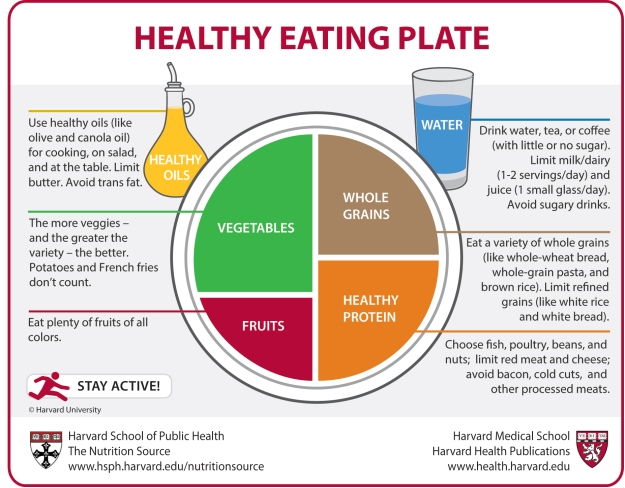Almost all of us know want to eat “healthier.” But what is the optimal diet for heart and general health? The answer really depends on our health goals. For example, are we altering our diet to lose weight? Do we have established conditions such as high blood pressure or high cholesterol which we are trying to improve? Or do we consider ourselves healthy but are trying to reduce our future risk of chronic disease, or ward off conditions in our family history?
All of these issues could impact what we consider a “healthy” diet for ourselves. if you have a specific health condition that is affected by diet, you really need to discuss this with your physician or health professional, since many diseases, including heart disease, high blood pressure, and high cholesterol can be profoundly impacted by your diet. For the rest of us, our dietary goals are generally to maintain or lose weight and prevent chronic disease. Although you will find a lot of conflicting advice on the Internet and elsewhere in this regard, we feel that the preponderance of evidence shows that a diet low in carbohydrates and fat, and an emphasis on the whole grains, fruits, vegetables, and lean meat is optimal for both weight control and long-term prevention. The so called “Mediterranean diet”is a well-known example, and there is sound evidence that adhering to this type of diet may prevent heart and vascular disease over time. This is the diet we recommend to our patients with known heart disease, and the key components are:
– Emphasizing fish chicken and other lean meats over red meat.
-using “healthy” sources of fat such as nuts, olive oil, and other unsaturated fat, such as canola oil.
-minimizing carbohydrates, especially processed flour, and using whole grains when possible.
-using a mix of fruits and vegetables, but minimizing potatoes, which have minimal nutritional value and act more like a processed carbohydrate.
This graphic, from the Harvard School of Public Health, is one of the most practical and informative summaries of a recommended diet:
There are many other diets which have been touted to improve health. Certain diets, such as the Atkins type diets which are very low in carbohydrates, can definitely promote weight loss, but the long-term benefits on heart and general health are uncertain, especially since they may contain very high amounts of fat intake. Others, such as the South Beach Diet, are based on fairly sound science and favor moderating both carbs and saturated fat.
If dietary advice can seem overwhelming, remember some past advice from a lecturer: “If the food looks the same as when it was pulled from the ground or off of a plant, it’s probably nutritious” – in other words, most foods in their natural state, when eaten in moderation and variety, are probably healthier than the alternatives.
There are some excellent online sources of information regarding the optimal diet, with much more specific tips and advice. One of the best sources is the Harvard School of Public Health, which has performed a lot of the original research on cardiovascular prevention and diet. Their excellent website can be found here. An article documenting the scientific evidence for the Mediterranean diet can be found here.
Dr. A and G’s top 10 diet tips:
1. Watch Portions! No matter how healthy your diet, watching your portions is critical.
2. Boosting protein (meat, beans, dairy) may fill us up and help reduce cravings for carbs and fats.
3. Although all processed carbs are bad, there is evidence that wheat-based carbs are particularly bad. This means white bread, pasta, flour tortillas, most cereals, and processed boxed foods. An excellent book explaining this is Wheat Belly by Dr. William Davis, one of my mentors during training in Cleveland. Breaking the bread habit could be the single most beneficial move for your health. I will write about my experience going “bread-free” in a future post.
4. Eat nuts! You need to watch portions, but there is quite a bit of evidence in favor of nut intake. Check out the Nut Consumption and Mortality YouTube video from the New England Journal of Medicine ..
5. While almost all fruits and veggies are good, potatoes seem to be on the “bad” list, since they contain such dense carbs and little other nutritional value. Yes, we love french fries too! On the other hand, emphasize the “super” fruits that contain antioxidants.
6. No one should drink alcohol for nutritional value, but there is evidence that those who drink mild to moderate alcohol do have some protection from chronic disease. There is little evidence that mild to moderate alcohol worsens or causes heart and vascular disease.
7. Ditto for caffeine. There is not much evidence for harm from low to medium amounts of daily caffeine, and possibly some benefit.
8. There is a lot of debate about dietary fat, but I advise patients to minimize saturated fat, particularly those with high cholesterol and known heart disease. That means red meats and dairy such as cheese and whole milk. The key is not to substitute the loss of fat with high carbs, which is often the case with “fat-free” products. Here is a link about a new study comparing low-fat and low-carb diets.
9. Avoid/minimize eating processed foods (great story of a friend having significant weight loss simply by not eating any food that came out of a package). Nutritionists are key in helping cardiologists improve people’s heart health. Ashley Koff has a great website with information about foods and diet, emphasizing the benefit of a Qualitarian approach to eating that includes unlimited vegetables.
10. Have you heard about the DASH diet ? Especially if a goal is to use diet/lifestyle to modify blood pressure the DASH diet is worth a look.



Pingback: Our 10 tips for Healthy Eating. . . . and More | The Heart Health Doctors
Pingback: Today’s News: More Reasons to Avoid Refined Sugar | The Heart Health Doctors
Pingback: Which Supplements Improve Wellness and Prevent Heart Disease? | The Heart Health Doctors
My husband tried the Mediterranean diet and his blood tests changed slightly then he read the books of dr Joel furhman and he lost over 40 lbs and his blood tests are remarkable. Please refer to dr furhman’s work and give it a try.
Pingback: Wrapping Up #HeartMonth | The Heart Health Doctors
Pingback: Is your Heart older than You? Find out your “Heart Age” | The Heart Health Doctors
Pingback: Saturated Fat: Old Foe, or New Friend? | The Heart Health Doctors
Pingback: Wine: Is it really a toast to good health, and a healthy heart? | The Heart Health Doctors